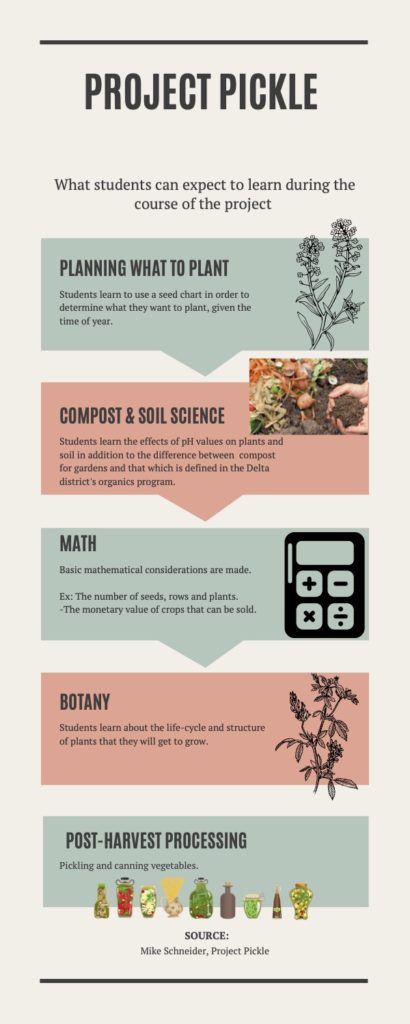
Farm education ready to expand beyond Delta classrooms
Project Pickle teaches students the importance of harvesting their own food
By Amir Khan
A Delta school program teaching school children how to grow their own food hopes a recent boost from Delta city council will help expand its reach to the entire province.
During the city council’s Jan. 10 meeting, Mike Schneider, a Delta resident who consults on urban agriculture issues presented Project Pickle, which stressed the importance of teaching children practical skills in food growing as a method to foster meaningful growth.

Food insecurity creates a need
The presentation comes at a time when rising food prices and supply chain shortages continue to threaten food security across the Lower Mainland and elsewhere.
“I’d like to see [the children] come inspired,” Schneider said. “I think the most sort of, immediately gratifying aspect is, a realization that if they plant their food, there’s a 99.9 per cent chance they’re going to eat it.”
Project Pickle began in June, 2012 when students from Pebble Hill Traditional Elementary in Tsawwassen, B.C. planted 200 pickling cucumbers in raised garden beds provided by the Delta school district. The project, which works with K-12 students aims at attracting youth to potential future careers in the food supply chain by teaching them how to plant, grow and harvest their own food.
“It is one of the positives of COVID, that I think people are doing more hobby gardens and their kids are getting involved,” said Coun. Alicia Guichon, chair of Delta’s agricultural advisory committee.
“We’re seeing that just even in our industry, that people are eating out less and they’re maybe growing more at home and just learning and getting their kids involved.”
The project has since, seen 74 classes sign up across eight schools, numbering approximately 1,800 students. According to Schneider, he expects to work with 37 classes per week with more expected to join the project during the spring season.
“I wish there were more of me or more people like me that we could cover all the schools,” Schneider said.
“The Delta council is interested in helping me get there through discussions with the Ministry of Agriculture and the Ministry of Education.”
Schneider hopes to place the Delta school district at the centre of a pilot project involving neighbouring cities and their respective school districts, with Project Pickle.
Delta is becoming a centre for agricultural projects
Coun. Bruce McDonald, an agri-business advocate dedicated to ensure that agriculture remains as a major contributor to Delta’s economy, pointed out the similarity between Project Pickle and the rain gardens that have already been established at Delta schools.
“[North Delta schools] all have rain gardens and schools and the kids take incredible ownership of them, they tend them, they work with them, they protect them and it’s an amazing interest in natural life,” McDonald said. “Growing things is something that I think we all can relate to.”
Coun. McDonald suggested, like with the rain gardens at Delta schools, to have Schneider prepare a workshop and to draft a strategy for implementing agricultural and horticultural literacy into the school curriculum. The suggestion was backed by a motion put out by Coun. Jeannie Kanakos to assist Schneider, which was voted in favour by all members of the council.
Due to the COVID-19 pandemic, Schneider has been prevented from delivering lessons in classrooms, however teachers at participating schools have opted to adopt a place-based learning approach, allowing students to learn outdoors, weather permitting.
“[Teachers] want to bring the kids down to the small school farm and spend a decent amount of time out there, so that’s good,” Schneider said.

Comments are closed.